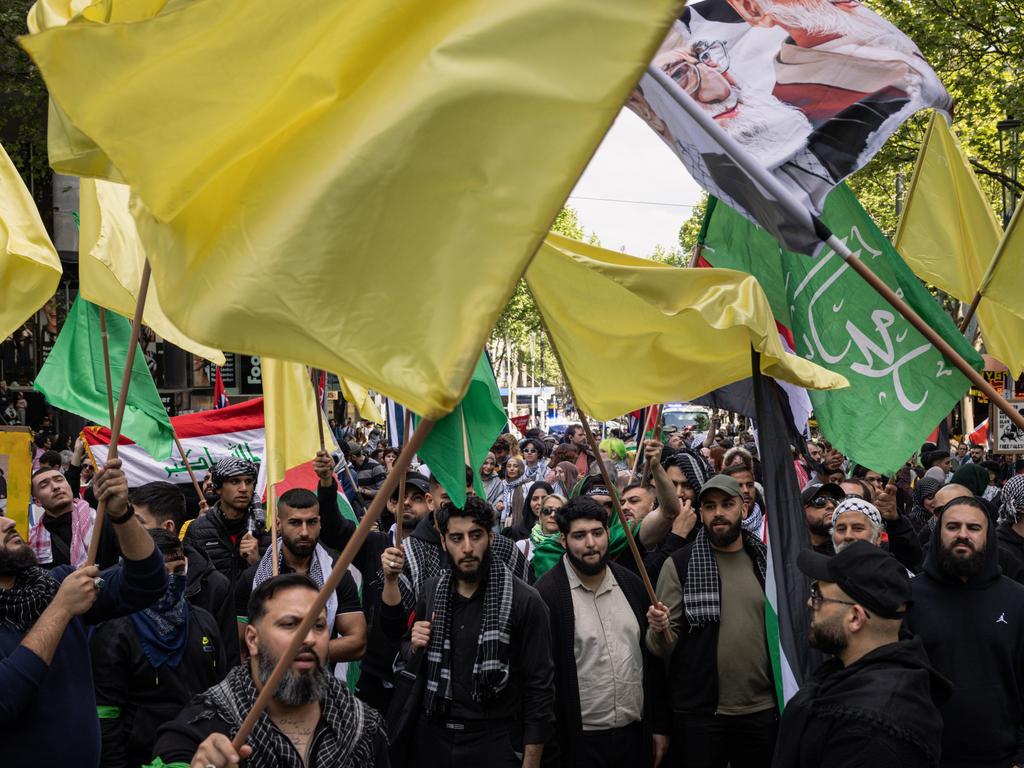How Labor failed the ultimate moral test on the Middle East


Within Western democracies this conflict has triggered a radicalisation of the political left and a moral crisis for the broader centre-left that lies at the heart of the Albanese government’s weakness and equivocation for the past year.
The left is being torn apart as its more radical elements, witness the Greens and activists, join with the pro-Palestinian movement to assail Israel as a war criminal and agent of genocide, while the governing and moderate centre-left – the Albanese government – has run a policy of fudge and compromise trying to reconcile the irreconcilable.
It can’t be done. This is a civilisational moment. Israel, post-October 7, sees its existence being threatened and won’t listen to other nations offering lectures without responsibility. The split in the left is a civilisational and ideological divide that defies compromise. In a sense one can appreciate Anthony Albanese’s dilemma, if not his response.
Labor’s reaction has been tactical. It criticises anti-Semitism and defends in principle Israel’s right to self-defence while it shifts foreign policy to favour the Palestinian cause, intensifies criticism of Israel and, given more than 40,000 Palestinian deaths, demands immediate ceasefires and an end to Israel’s campaign against the terrorists who seek its destruction.
The upshot is that Albanese has satisfied neither side – neither Australian Jews nor Australian Palestinians.

But there is a bigger dilemma: Labor has failed to grasp that this is a civilisational crisis. The ultimate issue is Israel’s right to exist. This is what Hamas, Hezbollah and Iran reject, and it is why Israel’s actions are so extreme. It is not operating according to Foreign Minister Penny Wong’s rules or view of the world.
The radical left now casts a democratic Israel as a racist, colonial, illegitimate nation and, as a consequence, fuses anti-Zionism and anti-Semitism. The Labor Party in the 2020s is trapped, its political character is now sufficiently hostile to Israel that Labor is incapable of the civilisational response required from true leadership.
Wong, a respected figure for years, is the symbol of this failure.
As Foreign Minister she visited Israel in January 2024 saying her mission was to seek “a pathway to peace”. Wong met families and survivors of the Hamas attack but her visit was conspicuous for not visiting the sites of the massacre. Can you imagine an Australian foreign minister visiting America after 9/11 and declining to visit the ruins of the World Trade Centre where so many were killed?
This was a calculated statement of reservation about Israel and the Netanyahu government, a decision to keep official Australian eyes distant from the worst massacre of Jews since the Holocaust. There was only one interpretation: Australia doesn’t fully share this moment with you.
In December 2023, under Wong’s direction, Australia changed position and joined 152 nations in voting for the Arab Group initiative in the UN General Assembly calling for an immediate ceasefire and the immediate release of all hostages. The resolution failed to condemn Hamas. Indeed, it did not mention Hamas and said nothing about the origins of the conflict. It was a moral travesty but revealed the depth of global opinion against Israel. Terrorism was given free passage.
Only 10 nations, including the US and Israel, voted against; a total of 23 nations abstained, including the UK, Germany, Italy and Ukraine. Australia broke from both its AUKUS partners and voted in favour, with Wong saying that while Australia would have preferred a “reference” to the October 7 attack, the resolution was “consistent” with Australian policy.
Shadow foreign minister Simon Birmingham said the only hope for peace was the removal of Hamas but if Israel adopted the resolution it would constitute a victory for Hamas. Australia’s vote confirmed it spoke with two voices depending on the audience – Anthony Albanese said Hamas must “lay down its arms” while voting for a UN resolution that meant it didn’t need to lay down its arms. It was a policy of fudge and deception, an effort to accommodate opposing constituencies.
Wong followed up on two further UN votes. In May, Labor voted in support of Palestinian aspirations for full membership of the UN. In September it abstained from – rather than opposed – a vote on a sweeping resolution calling on Israel to withdraw from the West Bank and Gaza within the year, calling for Israeli reparations to Palestinians and an arms embargo on Israel.
Wong expressed her deep disappointment that Australia was unable to support the resolution. It tried to get the necessary amendments but failed. But it refused to oppose this resolution and instead abstained, with our ambassador to the UN telling the assembly Australia’s recognition of a Palestinian state was “a matter of when, not if”.
In April Wong spoke at the ANU, further realigning policy against Israel and towards Palestine by backing early diplomatic recognition of a Palestinian state as a device to build momentum for a two-state solution – a change in Australian policy away from a recognition of a Palestinian state as the end product of a peace settlement as provided by the Oslo Accords.
Her policy shift received its full expression in her speech to the UN General Assembly on September 28. She said the parties were not of themselves moving to a two-state solution – hence Wong called for the imposition of a two-state solution based on a “clear timeline for the international declaration of Palestinian statehood”.

This is an extraordinary position for Australia. It comes at a time when support for a two-state solution is at rock bottom on both sides, when there is no governing authority in Gaza, when the conditions for reform of the Palestinian Authority do not exist, when Israel would never contemplate such an outcome until the terrorists groups were removed and Palestinians accepted Israel’s right to exist – with no sign of any progress towards such conditions.
Wong’s stance, being generous, could be branded utopian. More accurately, it is unrealistic, impractical and dangerous, surely designed for domestic presentation and gesture, more evidence of Labor’s policy reset towards Palestine, its appeal to the Muslim vote and its disdain for Israel.
There are two realities on display: Israel has changed as a country and Labor has changed as a party. One of the most striking signs of Labor’s hostility towards Israel came earlier this year when Assistant Foreign Minister Tim Watts, acting on Wong’s instruction, called in the Israeli ambassador to say Australia would not support any Israeli military action in Lebanon against Hezbollah given its constant rocket assaults on Israel – reports Wong has never denied.
For nearly a year Albanese and Wong have anchored their stance around two statements – opposition to anti-Semitism and saying Israel has the right to self-defence. These are lowest common denominator truisms. They should be the start of Labor’s response, not its end. They are totally inadequate to the moral and strategic issues at stake, and testify to Labor’s inability to grasp the real test it has faced as a government.
Contrary to the views of the progressive media, Peter Dutton has gained a values and moral ascendancy by his commitment to Israel, his repudiation of Wong’s foreign policy and his unqualified opposition to anti-Semitism while enjoying the unity of the centre-right.
Albanese, by contrast, has been unconvincing by trying to reconcile competing constituencies and views. Labor has got itself into a long-run bind. It has failed to take a moral position on a moral issue; it has shifted foreign policy to a pro-Palestinian position that is rejected by the Coalition and risks contamination by the unpopular radical left, and; in a repeat of its blunder over the voice, it risks being seen to undermine social cohesion for its own electoral needs.






Despite much commentary to the contrary, the evidence is conclusive – the Albanese government has engaged in a profound change to Australia’s policy in the Middle East and Israel that has moral, diplomatic and strategic dimensions.